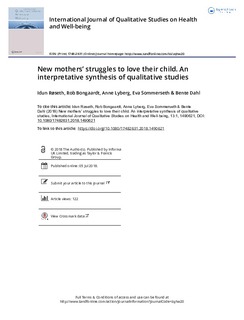New mothers' struggles to love their child. An interpretative synthesis of qualitative studies
Journal article, Peer reviewed
Published version
Permanent lenke
http://hdl.handle.net/11250/2569896Utgivelsesdato
2018Metadata
Vis full innførselSamlinger
Originalversjon
International Journal of Qualitative Studies on Health and Well-being. 2018, 13:1490621 1-11. 10.1080/17482631.2018.1490621Sammendrag
Purpose:
New mothers may question the nature of their motherly love after the birth. Most mothers find that feelings of affection come within a week from birth. However, some mothers are still struggling with this after many months. Many studies place strong emphasis on the importance of maternal affection for the development of the child. Few studies look into mothers’ experiences when maternal affection or love remains a struggle.
Method:
We present an interpretative synthesis based on a systematic analysis of five qualitative studies that report findings related to mothers’ stated inability to exhibit maternal affection.
Result:
In answer to our question “what characterizes the experiences of women who struggle with, or are unable to exhibit, maternal affection after birth”, we identified the uncertainty involved in imagining the unborn child, birth and maternal future, birth as a disillusionment, and the ensuing process of decreasing agency and increasing alienation. Especially a traumatic birth may lead to disillusionment.
Conclusion:
Health care workers and research can support a mother’s positive resolution of her struggle by promoting realistic and more open expectations for maternal affection as well as her sense of agency and ownership during birth and the early mother–child relationship.
Beskrivelse
This is an Open Access article distributed under the terms of the Creative Commons Attribution License, which permits unrestricted use, distribution, and reproduction in any medium, provided the original work is properly cited.

